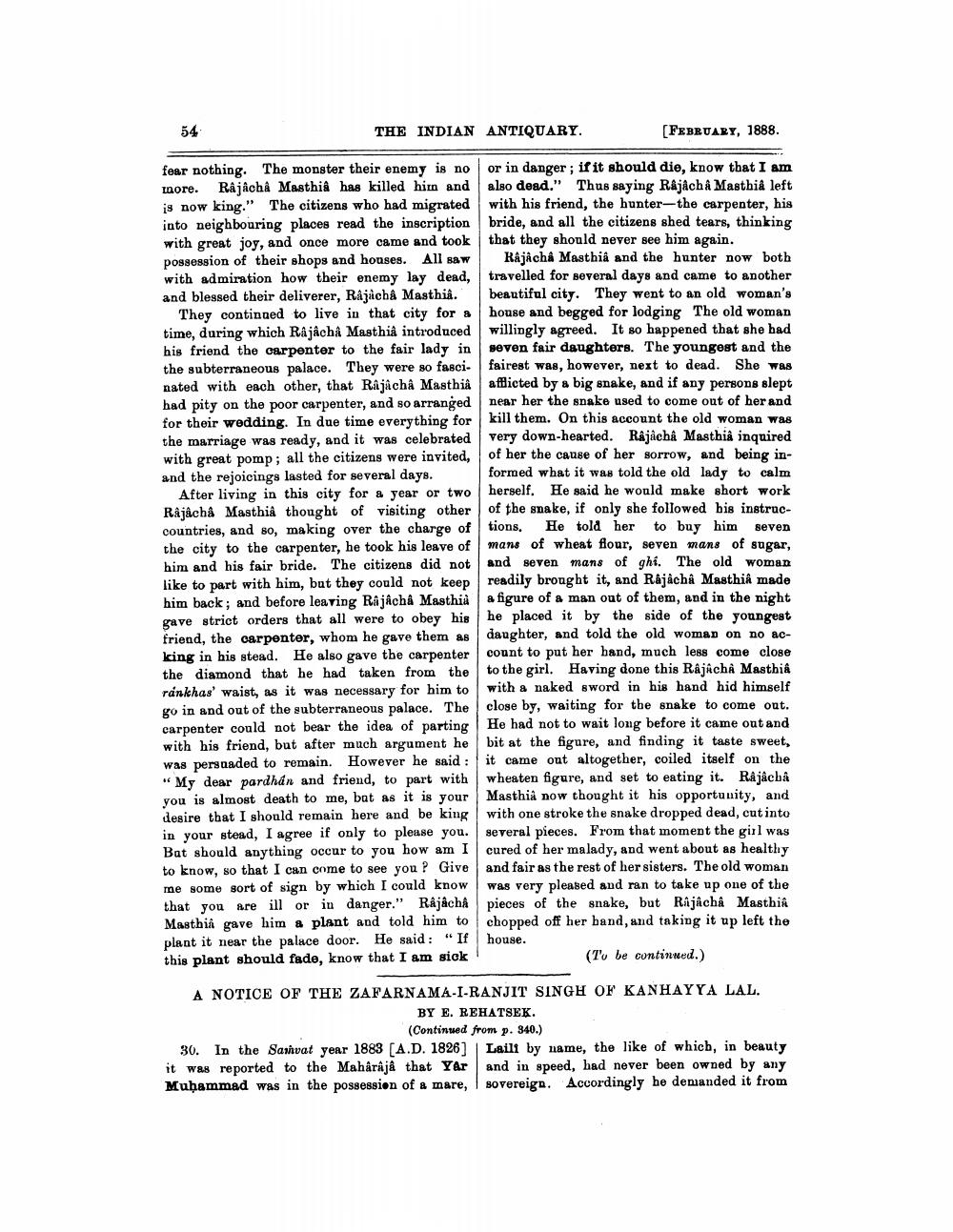________________
54
THE INDIAN ANTIQUARY.
fear nothing. The monster their enemy is no more. Rajacha Masthis has killed him and is now king." The citizens who had migrated into neighbouring places read the inscription with great joy, and once more came and took possession of their shops and houses. All saw with admiration how their enemy lay dead, and blessed their deliverer, Râjáchâ Masthiâ."
They continued to live in that city for a time, during which Râjâchâ Masthiâ introduced his friend the carpenter to the fair lady in the subterraneous palace. They were so fascinated with each other, that Râjâchâ Masthiâ had pity on the poor carpenter, and so arranged for their wedding. In due time everything for the marriage was ready, and it was celebrated with great pomp; all the citizens were invited, and the rejoicings lasted for several days.
[FEBRUARY, 1888.
or in danger; if it should die, know that I am also dead." Thus saying Rajâchâ Masthiâ left with his friend, the hunter-the carpenter, his bride, and all the citizens shed tears, thinking that they should never see him again.
After living in this city for a year or two Rajacha Masthiâ thought of visiting other countries, and so, making over the charge of the city to the carpenter, he took his leave of him and his fair bride. The citizens did not like to part with him, but they could not keep him back; and before leaving Rajâchâ Masthia gave strict orders that all were to obey his friend, the carpenter, whom he gave them as king in his stead. He also gave the carpenter the diamond that he had taken from the rankhas' waist, as it was necessary for him to go in and out of the subterraneous palace. The carpenter could not bear the idea of parting with his friend, but after much argument he was persuaded to remain. However he said: "My dear pardhan and friend, to part with you is almost death to me, bat as it is your desire that I should remain here and be king in your stead, I agree if only to please you. Bat should anything occur to you how am I to know, so that I can come to see you? Give me some sort of sign by which I could know that you are ill or in danger." Râjâchâ Masthia gave him a plant and told him to plant it near the palace door. He said: "If this plant should fade, know that I am sick
Rajacha Masthiâ and the hunter now both travelled for several days and came to another beautiful city. They went to an old woman's house and begged for lodging The old woman willingly agreed. It so happened that she had seven fair daughters. The youngest and the fairest was, however, next to dead. She was afflicted by a big snake, and if any persons slept near her the snake used to come out of her and kill them. On this account the old woman was very down-hearted. Rajâchâ Masthiâ inquired of her the cause of her sorrow, and being informed what it was told the old lady to calm herself. He said he would make short work
seven
of the snake, if only she followed his instructions. He told her to buy him mans of wheat flour, seven mans of sugar, and seven mans of ghi. The old woman readily brought it, and Rajachâ Masthiâ made a figure of a man out of them, and in the night he placed it by the side of the youngest daughter, and told the old woman on no account to put her hand, much less come close to the girl. Having done this Râjâcha Masthia with a naked sword in his hand hid himself close by, waiting for the snake to come out. He had not to wait long before it came out and bit at the figure, and finding it taste sweet, it came out altogether, coiled itself on the wheaten figure, and set to eating it. Râjâchâ Masthiâ now thought it his opportunity, and with one stroke the snake dropped dead, cut into several pieces. From that moment the girl was cured of her malady, and went about as healthy and fair as the rest of her sisters. The old woman was very pleased and ran to take up one of the pieces of the snake, but Râjâchâ Masthia chopped off her hand, and taking it up left the house.
(To be continued.)
A NOTICE OF THE ZAFARNAMA-I-RANJIT SINGH OF KANHAYYA LAL. BY E. REHATSEK. (Continued from p. 340.)
30. In the Samvat year 1883 [A.D. 1826] | Laili by name, the like of which, in beauty it was reported to the Mahârâjâ that Yar and in speed, had never been owned by any Muhammad was in the possession of a mare, sovereign. Accordingly he demanded it from




